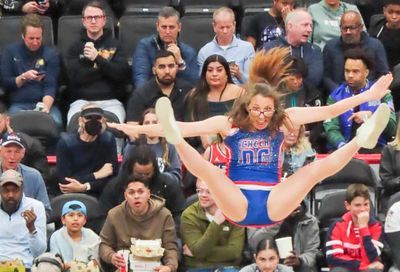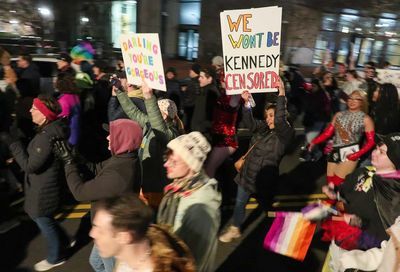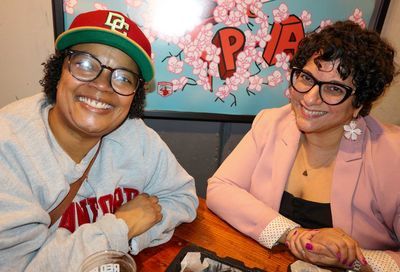Save the Clubs
Commentary: Town Square
I do not spend much time in nude dancing clubs. I nonetheless defend them for several reasons: Because adults in an international city like Washington should be able to make their own entertainment choices. Because I get pissed off when someone seeks to impose his distaste on other people, even though their different choice does him no harm. Because the clubs displaced by the District government in favor of a baseball stadium were legitimate, tax-generating businesses. Because the city owes them and their customers — whether gay or straight — a remedy to the problem it caused. Because many people enjoyed those clubs, and after all, closeted congressmen need someplace to go after hours.
The rescue of the ABC-licensed clubs displaced by the new stadium is at hand, but it needs your help. Bill 17-109 is titled, ”One-Time Relocation of Licensees Displaced by the Ballpark and Skyland Development Project Amendment Act of 2007.” The D.C. Council Committee on Public Works and the Environment has sent it to the full Council for further discussion and an initial vote, expected to occur on Tuesday, June 5. The Skyland provision was added to grant the same remedy to businesses in an old Anacostia shopping center which was similarly seized by the city for redevelopment.
Ward 1 Councilmember Jim Graham, author of the bill, moved it out of his committee after a recent ruling by the Alcoholic Beverage Control Board effectively nullified a 2001 legislative compromise that permitted relocation of ABC-licensed establishments featuring nude dancing. Essentially, the current bill would allow the displaced clubs that had been in a CM (commercial manufacturing) zone to move on a one-time basis to another CM zone, regardless of subzone, within one year of the bill becoming law. It doesn’t cut through the rest of the regulatory process, but gives the clubs a shot.
Numerous gay businesses were clustered off South Capitol Street for more than three decades, after being chased there in the early 1970s by then-Police Chief Jerry Wilson. They served District residents and visitors for decades in some cases. The city, having dislocated them, is honor bound to facilitate their relocation. Ideally, all of the displaced businesses (not just the ABC-licensed ones) should be allowed to cluster again elsewhere, but that has little support and much opposition. The Graham bill represents an achievable compromise.
The new locations identified by the former near-Southeast club licensees are all in Ward 5. Two are a long block apart on West Virginia Avenue, NE, next to Mt. Olivet Cemetery. The other two are north of New York Avenue, one east of Bladensburg Road and one west. All are among warehouses. It is hard to see how anyplace in town could have less impact on the neighborhoods.
With the hospitality industry generating a sizable portion of its revenue, the District should allow adult entertainment as part of the mix. Those who disapprove of such establishments can avoid patronizing them. Claims about associated rises in crime are not supported by the clubs’ history.
Ward 5 Councilmember Harry Thomas Jr. objects to having all four clubs move to his ward, but it is a fact of geography that the city’s largest CM-zoned area is in Ward 5. He says that his constituents should have a say — as if they all agreed with him, and as if they were prevented from testifying at Mr. Graham’s public hearing on the bill last year. In fact, many Ward 5 residents are defending the clubs, and opponents were given a well-publicized forum last year by then-Ward 5 Councilmember Vincent Orange. Mr. Thomas has cited the sizeable settlements the displaced property owners expect to receive from the city, but that does not apply to their former tenants, who will get nothing.
One guy asked me by e-mail, ”Would you consider supporting the Ward 5 community in moving the dance clubs to a more remote location?” He didn’t say where that might be. Setting aside the gratuitous insult implicit in the call for remoteness, warehouses next to a cemetery and railroad tracks are remote enough. The licensees found suitable locations they could afford. The Council, at its May 15 budget session, even earmarked up to $3.6 million in road funds to improve the major corridors near the clubs.
Bill 17-109 is probably our last chance to save gay-oriented adult entertainment in our city. Jim Graham has gone to bat for us. Please help by calling or writing his Council colleagues before June 5.
Richard J. Rosendall is a writer and activist whose work has appeared on Salon.com and the Independent Gay Forum (www.indegayforum.org). He can be reached at rrosendall@starpower.net. Contact information for D.C. Council members is at www.dccouncil.washington.dc.us.
Support Metro Weekly’s Journalism
These are challenging times for news organizations. And yet it’s crucial we stay active and provide vital resources and information to both our local readers and the world. So won’t you please take a moment and consider supporting Metro Weekly with a membership? For as little as $5 a month, you can help ensure Metro Weekly magazine and MetroWeekly.com remain free, viable resources as we provide the best, most diverse, culturally-resonant LGBTQ coverage in both the D.C. region and around the world. Memberships come with exclusive perks and discounts, your own personal digital delivery of each week’s magazine (and an archive), access to our Member's Lounge when it launches this fall, and exclusive members-only items like Metro Weekly Membership Mugs and Tote Bags! Check out all our membership levels here and please join us today!



















